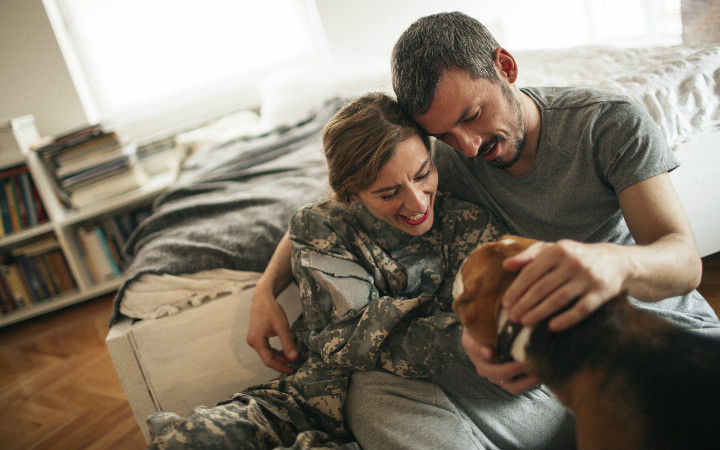At Pets for Patriots, we get calls from service members, veterans, and caregivers requesting our help to secure service dogs.
But when we ask if a well-mannered companion dog or cat would be better, people always asked, “What’s the difference?”
We are so glad you asked. First, a little context.
Wounds seen and unseen
According to the Defense Department, since 2003 more than 46,000 U.S. military personnel have been wounded in action in the Iraq and Afghanistan wars.
The incidence of Post Traumatic Stress Disorder (PTSD), Traumatic Brain Injury (TBI), depression and other psychological conditions has led to discussion of the “invisible wounds” of war.
Anecdotally, huge numbers of veterans with such wounds are not counted in the official Wounded In Action statistics. And criteria for the diagnosis and treatment of disorders like PTSD vary widely.
In the U.S., some estimates believe the invisibly wounded numbers in the hundreds of thousands.
Veterans of prior conflicts have and continue to suffer from these very same afflictions. But it took Iraq and Afghanistan to bring the true scope, nature, and human cost of these types of ailments into sharp relief.
However, the Veterans Administration’s own statistics cite a higher incidence of PTSD among Vietnam veterans than OIF/OEF veterans.
The public today is more aware of PTSD and, to a lesser extent, TBI and other trauma-related afflictions.
Many veterans with PTSD cope with feelings of isolation, depression, anger, heightened sensitivity to loud sounds, fear of crowds or anxiety in social situations in general.
It is therefore unsurprising that attention has turned to the human-animal bond as a way to help people overcome many of the emotional impacts of their conditions.
Companion animal
A companion animal is just another word for a family pet. Think Fido and Fluffy.
We celebrate the extraordinary, innate therapeutic abilities of everyday companion dogs and cats. It is why we focus solely on companion pets to achieve our mission.

Our organization advocates for pets, who – through no faults of their own – are relinquished to shelters with little hope of adoption. They can deliver many wonderful physical and emotional health benefits. However, they have no legal access to places where pets are normally not permitted (for limited exceptions, see “Emotional Support Animals”).
Despite their lack of legal access, companion pets can have life-changing – even life-saving – impacts on peoples’ lives.
Many veterans in our program with PTSD, depression, and other psychological challenges tell us that their adopted companion pets give them a renewed sense of purpose – even a reason to live. They are more able to re-establish healthy relationships with family and friends, and even forge new and positive relationships.
Read some of the many real-life stories of veterans who have experienced the life-altering love of a companion pet.
Service animal – federal law
The federal government defines a service animal as one who is trained to perform specific tasks on behalf of a disabled individual. The American Disabilities Act (ADA) defines a disability as:
“A mental or physical condition which substantially limits a major life activity such as caring for one’s self, performing manual tasks, walking, seeing, hearing, speaking, breathing, learning and working.”
The term “service animal” includes a wide range of animals highly trained for specific types of needs, such as signal dogs for the deaf, or seeing eye or guide dogs for the blind.
Federal law does not consider service animals as pets. They are viewed as equipment necessary for disabled people to manage the basic tasks of daily living.
Service animals are protected under the ADA and enjoy broad access to accompany disabled individuals wherever they need to go. This includes public transportation, private places of business, workplaces, residential complexes, and houses of worship.
Service animals are permitted legally to go to environments where pets are not typically permitted.
The ADA neither legally requires service animals to be certified nor has a certification standard. This gives disabled individuals latitude to have their animal trained to address their specific disability. But it invites abuse and diminishes the needs of those with real, serious, and legitimate disabilities.
Federal law prohibits businesses from asking individuals about the nature of their disabilities or demanding documentation for service animals. However, business are permitted to ask if the animal is required because of a disability, and what work or task the animal is trained to perform.
Service animal – training
Most service animals are dogs and are bred for purpose. Standards are high since these animals are called upon to perform fairly complex tasks. They must be able to work in stressful environments such as crowded stores, busy streets, and other environments that are difficult for most pets to endure.
Many dogs fail to graduate from service animal training for a wide variety of reasons.
While we do not discount the merits of non-traditional service animals like monkeys or horses, the simple fact is that dogs are most often used for service functions.
Dogs are highly trainable, easily accommodated in most living situations, and have a long track record of working with people to perform various complex tasks.
A successful canine candidate must have the right combination of temperament, size, life expectancy, activity level, strength, and other characteristics, depending upon the service for which he is being trained.
Typically, such a dog can cost between $15,000-$20,000, which includes years of evaluation, medical tests and training. These activities occur both before and after being matched and trained with his eventual handler.
Some organizations, like Freedom Service Dogs, select and train shelter dogs. Those that do not meet their strict criteria are adopted out to the public.
But the overwhelming majority of shelter animals lack the attitude and aptitude for service work.
We strongly discourage the adoption of pets for the purpose of training as service animals. Doing so stresses the animal unnecessarily by asking her to perform work for which she is ill suited.
Psychiatric service animal
A psychiatric service animal is a service animal who is trained to assist people who are disabled as a result of mental illness.
Animals trained for this purpose often provide life-saving tasks. These include preventing disoriented people from dangerous situations, bracing someone who is physically unstable from medication, or rousing a person who might sleep through a fire or burglar alarm as a function of being medicated.
Psychiatric service animals may be trained to detect an oncoming anxiety attack and take action to calm their handlers, or help them exit a stressful environment.
Many tasks performed by psychiatric service dogs are similar to those performed by mobility dogs. The only difference is that psychiatric service animals work for someone with an emotional versus a physical disability.
The International Association of Assistance Dog Partners (IAADP) details various tasks that a psychiatric service animal may be trained to perform.
Psychiatric service animals are often confused with Emotional Support Animals (ESAs). But a dog or cat who provides emotional comfort to someone with an emotional disability is not legally recognized as a service animal.
Therapy animal
This category of animal is not defined or protected by federal law. However, some states do have laws granting limited accommodation to therapy animals.
A therapy pet benefits people other than her handler, who is typically her guardian as well. Think of dogs or cats who visits hospitals and nursing homes to comfort the sick.

Reading therapy dogs have become increasingly popular in schools and libraries to act as ‘literacy mentors’ for children. More recently courthouse dogs provide comfort to crime victims when they testify.
Since therapy animals are not protected under the ADA there are no federal laws requiring that they be given access to places where pets are typically not permitted. And, unlike a service animal, a therapy animal is considered a pet.
Emotional support animal
These types of pets are perhaps the most ambiguous as far as federal law is concerned. They are used by people experiencing mental illness or psychological distress, and provide comfort just by their mere presence.
Emotional support animals – known as ESAs – are not required by law to be trained to perform any particular task. They are companion pets whose mere presence is assistive to an individual with a psychological disability.
These animals are not accorded legal status. However, the federal Fair Housing Act requires landlords to make reasonable accommodations for individuals who are prescribed an ESA to have such a pet in their dwelling. They may not discriminate based upon the animal’s breed, size, weight, or other physical characteristic.
Previously, ESAs were permitted to fly in the cabin of commercial aircraft outside of their kennels and without extra fees. However, the Department of Transportation has issued a new ruling effective January 1, 2021. Airlines are no longer required to extend to ESAs the same permissions granted to service animals.
Assistance animal
An assistance animal a term some people use to describe a service animal who performs or assists with physical tasks of daily life, such as picking up items, opening and closing doors or pulling wheelchairs.
While the ADA legally defines the term ‘service animal,’ some people and organizations use the term ‘assistance animal’ interchangeably. Others use the term in reference to any animal who helps an individual with a physical or emotional disability.
However, the term ‘assistance animal’ has no specific legal meaning and is not referenced in federal law pertaining to service animals. It is a generic term with no agreed-upon meaning and does not carry the force of law.
See our resources page for more information about service animal organizations and ESAs.












Thanks for making me understand the differences. I have been suffering from anxiety disorder since last few years. But, I am still confused. Will I qualify for a psychiatric service dog or an emotional support dog?
I am 2 tour Viet Nam War Vet. I sought information from our local VA Center here regarding a Service Dog for my wife in desperate need of a DAD (Diabetic Alert Dog) I was told that tge VA DOES provide benefits for the training of a family members service dog.
We (purchased specifically for this) a German Shepherd. But, searching through all the listed programs, I have yet to find any within those listed that do train owner’s dog. We have a trainer providing basic training, but need the professional “alert” training. So I have to ask, are there any here in Texas (Temple, TX).
Thank you for your service. We would not be allowed to have this conversation if it wasn’t for the brave men and women of the country.
I have bilateraltenites from being on ship and in combat around aircraft ,weapons action.I also have older sisterwho also severed in the navy who has ptsd.we would greatly appreciate an dog thats not very big my sister amd i lost a boston terrior who was anjel to us .
I was diagnosed with bilateral asbestos pleural disease in 2010 and recently I had a CT scan that revealed and accelerated progression in the disease. I have difficulty breathing and pain. I was a boiler tech. On the USS Orleck In the US Navy and was honorably discharged in 1975. I have a dog that has been with me for over 12 years and alerts to me when I am in pain and coughing. I wish for her to be with me 24-7 and everywhere I desire to go. How do I go about getting her registered. She has not been trained but exhibits the skills a trained dog would have?
Can you tell me, how you get a PTSD Service Dog? Also, what these great animals are trained to help with. I am a combat veteran, from Viet-Nam, with severe PTSD. I am truly interested in obtaining a service animal, if at all possible. Any information on this subject would be very much appreciated and helpful to an old Viet-Nam veteran. Thank You, so much in advance.
Phillip D. Snyder
Phillip, thank you for your service.
Pets for Patriots is not involved in the acquisition or training of service animals. Service animals are specifically trained to perform tasks for their handler (you) that are specific to your disability, whether that is emotional or physical (or both). For example, if you suffer with nightmares the animal may be trained to wake you, lay on your body to comfort you, etc. If you take medication and it makes you drowsy or unable to hear things like the phone or doorbell, the animal can be trained to alert you. The whole idea of a service animal is that it is trained specifically for the person for whom it will be working.
You can learn more about psychiatric service dog tasks – including for people with PTSD – in this whitepaper: http://www.iaadp.org/psd_tasks.html
And you can look into organizations that provide service animals for veterans on our resources page: https://www.petsforpatriots.org/resources/
We hope this information helpful in your journey to heal!
Im desparately looking 4 assistance in gettin a Psychiatric Service Dog OR a Service Dog for PTSD & protection & alerts 2 up coming medical condition situations & hazardous situations, ETC. ! ! Hav read all the definitions on different types of service dogs & seems what type I need is combined in2 different catagories & not in just one ! Can anyone please help me? Wud b most grateful 4 any assistance! ! Iv found that what I need falls under 3 different service dog catagories!
Many Vets are returning home to dogs that they already have. These animals may have been left in a foster home or with family or friends. Is there a program or grant for these Vets to get training for these dogs?
I am just glad that you are able to get the dogs not matter what the reason is that you need them for. And that they are helping you. You guys deserve it. Dogs can be the best medicine. And thank you for your service.
Stupid phone.
The othet thing is that the ADA actually changed some of its language from “service animal” to “service dog”, so other animals may not be considered service animals anymore. Exceptions are helper monkeys (in the home, not in public, AFAIK) and guide horses, but that’s it.
ADA actually only covers dogs and in some cases miniature horses as Service Animals. They do not even include monkeys at home or (especially) in public.
I think what is missing in the article in the paragraph on psychiatric service dogs is a mention of the fact that a dog is only a service dog if the handler is legally disabled (meets the ADA definition) and the dog is trained multiple, demonstrable tasks that relate directly to the handler’s needs. Plus clarification that obedience training or providing comfort are not considered tasks.
I have seen a big push to get service dogs to soldiers, which is great. But I see a lot of doctors and organizations recommend service dogs to people who don’t meet the ADA requirement of being legally disabled and I’ve found that many doctors do not understand the difference between a service dog and an ESA (and often refer to both as therapy dogs, to boot.)
The othet thin
What is lacking in this country is being properly informed. Personally I want to thank you for fighting for us, so we could remain in the life we enjoyed. I have always stood behind our troupes, but I cannot say that for government. I understand why liberals are angry, but they are taking it out on the wrong people. As far as I am concerned you guys should be getting paid like rock stars or pro athletes. You did a job that was asked of you and did it well. There is no place in a civilized society that condones abuse in any form. For these individuals that are hurting Veterans and their Service dogs, they should be punished as if they were attacking the President himself, you should be protected by us. This is a great article and i just want to say, I haven’t’ been in a war, or a criminal, but I have people that don’t care for me because I believe and love Jesus. So don’t let these nasty people get you down and I will pray that God send his angles to protect you and you Service dog. Again Mahalo “Thank You”
Absolutely right. My dog in an ESA. I have had my coworkers call him a therapy dog. I printed out a page with the differences and explained them. I do have permission to take my ESA to school with me, but not to work. I work for AAFES, but our location is very small and my bosses understand my condition. However, school has a big population with constant new people. My ESA is great at being a buffer between me and them. I do put a vest on him and gave a “do not pet” leash, but that’s after having problems with people respecting my space and trying to play with my dog while he’s wirking. Yes, he’s an ESA, but he picks up on me becoming anxious and tense and he’ll calm me before it escalates. Also, yes, it is exhausting that people ask do much. And, some days, I am not in the frame of mind to be patient or talk.
I am a Vietnam vet. I use a service dog. When you stop and ask me about my dog, wearing a vest made from my old uniform showing my unit. Please do not pet my dog. Please do not ask me what happened. And please stop beating up on veterans with service dogs. I’m read all to often about how a vets are being attack and beaten up just for having a service dog. This is the same treatment I got back when I return from Vietnam. I call on all military personnel who use SDs. If you are attacked, fight back, hell with injuries. Remember your warriors heritage. Remember the people attacking you are cowards.
I shall not be attacked again just for being a vet who needs a dog.